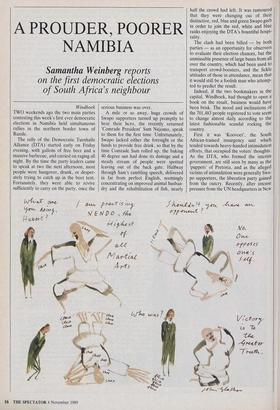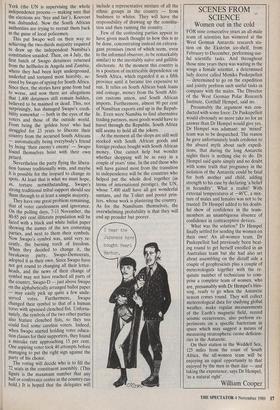A PROUDER, POORER NAMIBIA
Samantha Weinberg reports
on the first democratic elections of South Africa's neighbour
Windhoek TWO weekends ago the two main parties contesting this week's first ever democratic elections in Namibia held simultaneous rallies in the northern border town of Runde.
The rally of the Democratic Turnhalle Alliance (DTA) started early on Friday evening, with gallons of free beer and a massive barbecue, and carried on raging all night. By the time the party leaders came to speak at two the next afternoon, most people were hungover, drunk, or desper- ately trying to catch up in the beer tent Fortunately, they were able to revive sufficiently to carry on the party, once the serious business was over.
A mile or so away, huge crowds of Swapo supporters turned up promptly to hear their hero, the recently returned `Comrade President' Sam Nujomo, speak to them for the first time. Unfortunately, Swapo lacked either the foresight or the funds to provide free drink, so that by the time Comrade Sam rolled up, the baking 40 degree sun had done its damage and a steady stream of people were spotted leaving out of the back gate. Halfway through Sam's rambling speech, delivered in far from perfect English, seemingly concentrating on improved animal husban- dry and the rehabilitation of fish, nearly half the crowd had left. It was rumoured that they were changing out of their distinctive, red, blue and green Swapo garb in order to join the red, white and blue ranks enjoying the DTA's bountiful hospi- tality.
The clash had been billed — by both parties — as an opportunity for observers to evaluate their election chances, but the unmissable presence of large buses from all over the country, which had been used to transport crowd-boosters, and the fickle attitudes of those in attendance, mean that it would still be a foolish man who attemp- ted to predict the result.
Indeed, if the two bookmakers in the capital, Windhoek, had thought to open a book on the result, business would have been brisk. The mood and inclinations of the 701,483 people registered to vote seem to change almost daily according to the latest fashionable scandal rocking the country.
First it was `Koovoet', the South African-trained insurgency unit which tended towards heavy-handed intimidation efforts, that occupied the voters' thoughts. As the DTA, who formed the interim government, are still seen by many as the `puppets' of Pretoria, and as the alleged victims of intimidation were generally Swa- po supporters, the liberation party gained from the outcry. Recently, after intense pressure from the UN headquarters in New York (the UN is supervising the whole independence process — making sure that the elections are 'free and fair'), Koovoet was disbanded. Now the South African authorities are trying to recruit them back in the guise of local policemen.
This put Swapo well on their way to achieving the two-thirds majority required to draw up the independent Namibia's constitution unaided. Then, on 4 July, the first batch of Swapo detainees returned from the hellholes in Angola and Zambia, where they had been kept underground, underfed and tortured most horribly, ac- cused by Swapo of spying for South Africa. Since then, the stories have gone from bad to worse, and now there are allegations that 1,400 detainees still remain hidden, believed to be maimed or dead. This, not surprisingly, has damaged Swapo's credi- bility somewhat — both in the eyes of the voters and those of the outside world. From being the 'golden boys' who had struggled for 23 years to liberate their country from the accursed South Africans — automatically being everybody's friend by being 'their enemy's enemy' — Swapo found themselves hoist with their own petard.
Nevertheless the party flying the libera- tion banner traditionally wins, and maybe it is possible for the leopard to change its spots. At least that is what we must hope, as, torture notwithstanding, Swapo's strong traditional tribal support should see them through to at least a simple majority.
They have one great problem remaining, that of voter carelessness and ignorance. On the polling days, 7-11 November, the 80-85 per cent illiterate population will be faced with a black and white ballot paper showing the names of the ten contesting parties, and next to them their symbols. Now Swapo's symbol was, until very re- cently, the burning torch of freedom. When they decided to change it, the breakaway party, Swapo-Democrats, adopted it as their own. Since Swapo have not got round to changing all their letter- heads, and the news of their change of symbol may not have reached all parts of the country, Swapo-D — just above Swapo on the alphabetically arranged ballot paper — may easily pick up quite a few unde- served, votes. Furthermore, Swapo changed their symbol to that of a human torso with upraised clenched fist. Unfortu- nately, the symbols of the two other parties also feature clenched fists, so they too could fool some careless voters. Indeed, when Swapo started holding voter educa- tion classes for their supporters, they found a mistake rate approaching 15 per cent. One aspiring voter took 40 attempts before managing to put the right sign against the party of his choice.
The voting will decide who is to fill the 72 seats in the constituent assembly. (This figure is the maximum number that any hall or conference centre in the country can hold.) It is hoped that the delegates will include a representative mixture of all the ethnic groups in the country — from bushmen to whites. They will have the responsibility of drawing up the constitu- tion and then running the country.
Few of the contesting parties appear to have given much thought to how this is to be done, concentrating instead on extrava- gant promises (most of which seem, even to the informed observer, to be remarkably similar) to the inevitably naïve and gullible electorate. At the moment this country is in a position of inextricable dependence on South Africa, which regarded it as a fifth province until it became too expensive to run. It relies on South African bank loans and coinage, money from the South Afri- can customs union, and South African imports. Furthermore, almost 90 per cent of Namibian exports end up in the Repub- lic. Even were Namibia to find alternative trading partners, most goods would have to travel through the Republic. South Africa still seems to hold all the jokers.
At the moment all the shops are still well stocked with South African goods and foreign produce bought with South African money. One cannot help but wonder whether shopping will be as easy in a couple of years' time. In the end those who will have gained most from the transition to independence will be the countries who helped put the whole deal together (in terms of international prestige), the UN, whose 7,400 staff have all got wonderful suntans, and the T-shirt and poster prin- ters, whose work is plastering the country. As for the Namibians themselves, the overwhelming probability is that they will end up prouder but poorer.

















































 Previous page
Previous page